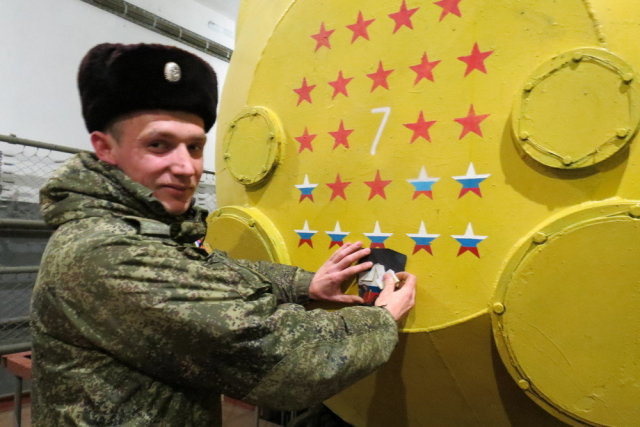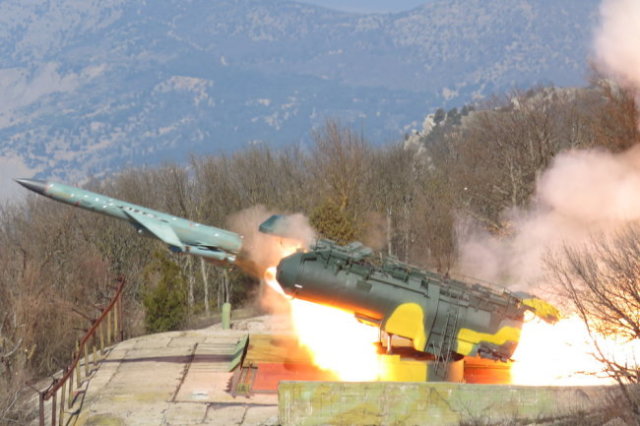Against the background of the NATO exercises, the Black Sea Fleet held joint missile firing by the crews of the small anti-submarine ships " Suzdalets "and" Kasimov "and the combat crew of the coastal missile complex (DBK) of the mine-based"Utes". They were held on the so-called sudden introduction, when the rocket scientists were given the task to prepare two missiles in a short time.
During missile firing, it is very important to ensure safety in the combat training area and to prevent ships from entering the closed range. This task was carried out by more than 15 warships and auxiliary vessels of the Black Sea Fleet, which previously occupied designated positions in the Black Sea. And they were helped by the station of long-range over-the-horizon radar detection "Monolit-B", which worked on a specially equipped site in the mountains. It is able to track targets even near the Romanian Constanta, which is 390 kilometers from Sevastopol in a straight line. And it can also determine the nationality of goals on the principle of "friend-foe". What was very important in the course of the current exercises: after all, just these days, the NATO Sea Shield maneuvers took place on an unprecedented scale in the Black Sea, in which 18 warships and support vessels were involved. NATO members have an increased interest in the Crimean coast, but the "Monolith" can actively track up to 30 targets. Well, the Progress rocket can get any of them, if necessary.
Interestingly, the launch of missiles is always preceded by the launch of diesel generators - thus simulating the situation of de-energization, possible in a military conflict or accident.
-The fact is that during firing, the power of the missile system for reliability comes from powerful diesel generators, - explained the commander of the technical battery, Captain Alexey Kozlov. - There should be no failures in their work, otherwise the cycle of preparing the rocket for launch will be lost. One hundred percent reliability of operation of powerful diesel generators is provided by our specialists.
The commander of the launch battery of the BRK "Utes", Captain Yevgeny Nezhdko, has already had 17 successful firings. And now, from the observation deck, you can clearly see how the powerful Progress rocket once again roared into the cold March sky and lay down on the set course. Telemetry specialists tracked its flight. The backup rocket was ready for launch, but it was not needed. Everything went as planned and as planned. "Suzdalets" and "Kasimov" found and took on the escort of an air target, the role of which was performed by the Progress missile, fired at the conditional enemy by the combat crew of the Utes DBK.

- 3M44 "Progress" missiles due to the long range of fire with external target designation can cover the coast with a length of several hundred kilometers, - says the shooting manager, the commander of the "Utes" division, Lieutenant Colonel Dmitry Bely. "The Progress missiles are not new, but they are very reliable. Their powerful high-explosive or special warhead will disable a ship of any class. Their flight range is up to 460 kilometers.
After successful firing, the rocket men lined up near the footstool with the Russian tricolor and a memorial sign to the first coastal rocket men. The brigade commander, Lieutenant Colonel Alexey Shcherbak, thanked his subordinates for their service. And in response, I heard a loud and friendly "We serve Russia!" Before the formation, Lieutenant Colonels Dmitry Fedko and Dmitry Bely were handed "fingers" - metal pins the size of a palm that remain in the container after the rocket launch, according to a long tradition. This is an unofficial award for coastal rocket scientists. And on the lid of the rocket container, Sergeant Andrey Kalyuzhny was happy to apply another tricolor star with a stencil. They continue the chronicle of the Soviet red stars that appeared under the USSR-they draw them by the number of successful missile launches.
- Of course, I was a little worried, - Dmitry Bely admits after the exercises, - after all, my first shooting in a new capacity, although I previously served in this division and I know the match well. We continued the good tradition of my predecessor, who last school year, during three practice firings, fired four Progress missiles to practice the fleet's combat training tasks.
Vladimir Pasyakin (Sevastopol)

